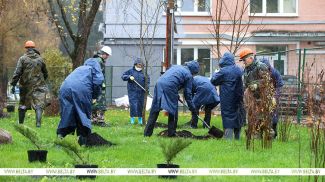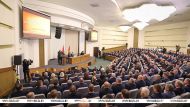MINSK, 6 September (BelTA) – Belarus' response to the pandemic has proved effective, Chairwoman of the Council of the Republic Natalya Kochanova said as she addressed the 13th Summit of Women Speakers of Parliament "Women at the center: From confronting the pandemic to preserving achievements in a gender-responsive recovery", BelTA learned from the press service of the upper house of the Belarusian parliament.
The speaker noted that the theme of the forum is relevant for all countries. The coronavirus pandemic has affected almost the entire planet and threatens the life and health of people of various countries.
“While tackling the pandemic, every country has been taking measures taking into account its national specificities, social system and economic capabilities. During the pandemic, Belarus has accumulated valuable experience. We have implemented a wide range of public health and medical measures to counter the spread of infection and to treat people. We have established the mechanisms of interaction between all branches of government The parliament and the government have adopted relevant legal acts,” Natalya Kochanova said. “Work is carried out in all areas. We have been working to ensure the safety of doctors and the population, to produce personal protective equipment, to work out logistics of treating and monitoring patients with mild symptoms at home and severe ones in hospitals. We have development a system of health resorts for the rehabilitation of patients and set up the production of the Sputnik V vaccine at Belarusian enterprises. Active vaccination drive is underway in the country."
According to the chairwoman of the Council of the Republic, the coronavirus pandemic has forced everyone to take a different look at the value of life and health, and most importantly, at doctors. Social significance of their work has significantly increased.
“The Belarusian healthcare can rightly be called a female sector. Women account for 75% of specialists working in healthcare in Belarus, and each, without exceptio,n performs her professional task with dedication and commitment. Our doctors are fighting for every life! The Belarusian healthcare system was able to cope with a serious load, because we have preserved all its links: sanitary and epidemiological service, infectious hospitals, rural healthcare posts and hospitals in the smallest district centers and, most importantly, specialists,” Natalya Kochanova said. “Belarus values the real heroes of the pandemic. By the decision of the head of state, healthcare workers have been honored with state awards, certificates of honor for their selfless work. It was the infectious disease doctor who for the first time in the history of independent Belarus was awarded the honorary title "People's Doctor of Belarus". In addition, the government has earmarked financial resources for additional payments to healthcare workers."
The speaker recalled that Belarus did not impose the strict quarantine measures during the pandemic. Therefore, the decline in business activity and the economy as a whole was one of the lowest in the European region. In order to preserve the sectors that were subject to the negative impact of the epidemiological situation, a special presidential decree "On Supporting the Economy" was adopted. The document provided for deferrals on rental payments, reducing the amount of taxes, restructuring debts for energy resources. These industries included tourism, retail, catering, and transportation, where the majority of workers are women.
“The most important trend during the pandemic was an active use of new flexible forms of employment. There were no mass job cuts in Belarus. Families with children were one of the most vulnerable categories during the pandemic. We enacted additional financial support measures for low-income families with many children. With the start of the pandemic, the work of social services was promptly restructured. Elderly care homes operated in complete isolation and medical staff worked in shifts to minimize the risk of spreading the infection. The social service centers organized free door-to-door deliveries of food, basic necessities and medicines for disabled citizens. The pandemic response and support model chosen by Belarus proved its worth: there was no reduction in wages, all social obligations were fulfilled, pensions were paid in full,” Natalya Kochanova said.
The chairperson of the Council of the Republic emphasized that Belarus is a welfare state based on the inviolable human rights principles. Achieving gender equality in all walks of life, ensuring equal opportunities and enhancing the role of women in society have always been among the top priorities on the way to sustainable development of Belarus. A fundamental legal framework has been developed for that purpose. The Fifth National Plan of Action on Gender Equality is in progress. Legal, organizational and administrative measures have been taken with the aim of advancing the status of women and protecting their rights and interests.
“Our country has come a long way in gender relations, and we are constantly studying the international experience in the gender policy. Today Belarus is among the top thirty states by such criterion as women's representation in the legislative bodies. Women hold high positions in the state administration and make one third of all MPs. Women make a significant contribution to the restoration and development of national traditions, to the creative development agenda, to inter-ethnic dialogue and to solving the problems of poverty and economic inequality. Majority of women supported the Belarusian state during a difficult period of external interference in the country's internal affairs and attempts to change the constitutional order after the presidential election in 2020. We did not let our women be dragged into the national confrontation,” Natalya Kochanova said.
Belarus is proud of its women, Natalya Kochanova said. “Striving for success and excellence in everything - these are actually the national traits of Belarusian women. Our task as MPs is to create favorable conditions and incentives for self-development and active participation of women in political, economic and social lives of our countries. I am confident that the summit will contribute to the goal,” she concluded.













